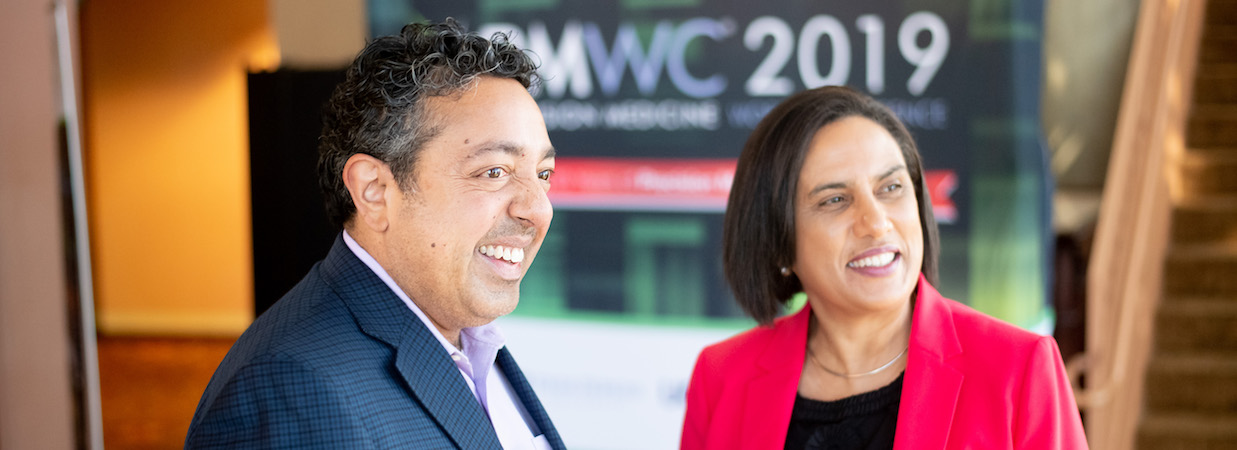
By Sarah Paris
For the fourth year, UCSF co-hosted the Precision Medicine World Conference, which attracted attendees from 35 countries to hear about the growing prominence of data science, artificial intelligence, and deep learning that is creating a sea change in nearly every aspect of health care and biomedical research.
With five different thematic tracks and 400 speakers, the conference showcased UCSF’s leadership in precision medicine, which has continued to expand since Chancellor Sam Hawgood first named it as one of four institutional priorities in 2015.
UCSF Chair of Epidemiology and Biostatistics Kirsten Bibbins-Domingo, MD, PhD, the inaugural vice dean for Population Health and Health Equity, opened the three-day event by affirming the university’s commitment to precision medicine as part of its public mission of advancing health worldwide. She urged attendees to reflect on how extraordinary science, discovery, and innovation can be used to foster health equity, noting that “diversity in science is simply good science.”
In the first fireside chat of the conference, Atul Butte, MD, PhD, director of the Bakar Computational Health Sciences Institute (BCHSI), spoke of his vision for the role of artificial intelligence in medicine. Refuting the dichotomy of “physicians vs. AI,” he asserted that the actual gap will be “doctors with AI versus doctors without AI.” Using the examples of expert tax advisors and skilled car mechanics, Butte made the case that instead of putting doctors out of work, new computational tools and technology will give physicians “superpowers”to mine the immense amounts of data being generated in biomedical research and clinical care, including better understanding of human genetics.
Watch Atul Butte's Fireside chat
UCSF Diversity of Expertise
Altogether, UCSF faculty gave nearly 30 presentations at the conference, spanning a wide range of topics. Among the many highlights:
- Precision Cancer Medicine: In his presentation, pediatric cancer researcher Alejandro Sweet-Cordero, MD shared advances in pediatric diagnostics, combining the UCSF500 cancer genetic panel with tumor board expert analysis at the UCSF Cancer Center.
View Alejandro Sweet-Cordero's slides - Big Date to Predict Outcome: Laura Jelliffe-Pawlowski, PhD, director of Precision Health and Discovery for the California arm of the Preterm Birth Initiative, showed the human and financial cost of the worldwide preterm crisis and ways in which PTBi aims to address it by using big data to identify women at highest risk.
Watch laura Jelliffe's Presentation
- SPOKE: Doctoral candidate Charlotte Nelson, along with her mentor Sharat Israni, PhD, demonstrated how SPOKE (Scalable PrecisiOnMedicine Knowledge Engine) can turn data into visual information at the point of care. Leveraging biology, chemistry, computer and data sciences via knowledge networks such as SPOKE is seen as foundational to precision medicine.
View Charlotte Nelson's and Sharat Israni's slides - Artificial Intelligence Apps: Ben Glicksberg, PhD, a postdoc in Atul Butte’s lab, described tools being built at BCHSI to use EHR data to improve medical practice. He also illustrated the move towards a learning health system, which was the subject of a recent paper in Nature.
View Ben Glicksberg's slides - Education: UCSF School of Medicine Executive Vice Dean Catherine Lucey, MD sees the disruption of precision medicine as an opportunityto develop physicians who are trained to use data to design targeted therapies and prevention strategies. The workforce will need to be increasingly interprofessional, with clinical teams that include scientists, visualization experts and genetic counselors. Lucey also stressed the need to create opportunities for students and residents to consult and collaborate with basic and computational scientists.
Watch catherine Lucey's presentation
Fireside Chats
A number of sessions were structured as conversations between notable leaders in particular areas, allowing for sharing of personal views and insights into the challenges as well as the promise of precision medicine.
- Clinical Genomics: Aleksandar Rajkovic, MD, PhD, who was appointed UCSF Chief Genomics Officer last May, talked with his Stanford counterpart Neal Boerkoel about the practical challenges of genomic screening of patients. He noted the reluctance of insurers to pay for genetic testing, a barrier that could be bypassed in “closed”, self-insured health systems.
Watch Aleksandar Rajkovic's fireside chat Watch the panel discussion
- Payor Perspective: Aetna CMO Harold Paz, MD, was interviewed by India Hook-Barnard, PhD, on how the insurance industry perceives the value of precision medicine. Stressing prevention and the role of community clinics and pharmacies, including CVS recently merged with Aetna, Paz noted that 60% of one's health comes from behavioral and environmental factors, where precise data could establish evidence of effectiveness.
Watch the fireside chat with India Hook-Barnard
- Ethics: Bioethics scholar Barbara Koenig, PhD, RN, in her discussion with Stanford colleague David Magnus, sounded a note of caution. “Upfront informed consent is not enough,” she stated, and explained that the “trustworthiness” of institutions is key. The adoption of strong governance models is necessary to protect patient privacy. These models must be informed by robust community engagement and include participant education about the risks and benefits of data sharing.
Watch the Fireside chat with Barbara Koenig
View More UCSF Presentations
- Regulating T Cells and their Response to Cancer (Lawrence Fong)
- Precision Medicine, Prevention, and Policy (India Hook-Barnard)
- The Contribution of “Omics” Technologies and Wearable Devices (Peter Ganz and Geoff Tison)
- Enriching Genomics Data - Courtney Lyles
- Combinations with Other Modalities (Pamela Munster)
- Emerging Applications in Genomic Medicine (Minnie Sarwal)
- Overcoming Obstacles to Patient Data Sharing (Mark Savage)
- Challenges In Applying AI On Biomedical Data (Laura J. Van't Veer)
- Enriching Genomics Data (Tracey Woodruff)
